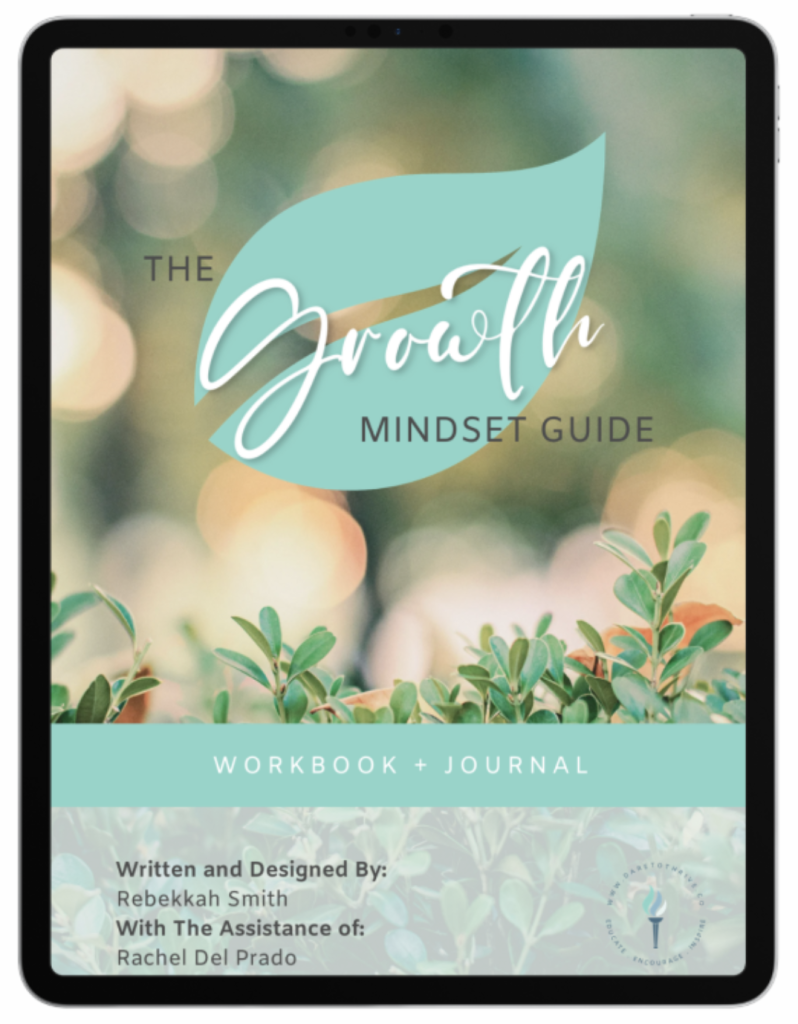Welcome to part three of How To Develop a Growth Mindset. In this article, I’m going to share 6 mindset shifts and skills you can learn to make your mind work for you. If you haven’t already, you can read part one here and part two here.
In the last article, I broke down my step by step process for creating realistic goals. I gave you what I call The 4 D’s of Goal Mapping™, along with an example of how to use it. If you haven’t already, you can grab a free copy of The Growth Mindset Guide here. Otherwise, let’s jump in!
6 Mindset Shifts and Skills To Make Your Mind For You
 1. Emotional Awareness
1. Emotional Awareness
Learning to become aware of your own emotions is the first step towards overhauling your mindset. The reason for this is simple—if we aren’t willing to be aware of our emotions, how do we provide emotional support to others in their time of need?
Emotional awareness requires that we learn some new skills.
- Accepting that we are flawed and will inevitably make mistakes.
- Willingness to acknowledge all types of emotions, but especially the hard-to-handle ones.
- Willingness to let go of negative emotions.
- Willingness to embrace imperfection.
- Willingness to adopt a growth mindset.
This is by no means an exhaustive list. But by getting started with these fundamental skills, you’ll be amazed at how transformational they are to you and your loved-ones.
As you read this article, please keep in mind that learning new skills takes a teachable mind and lots of patience and effort. It also takes time to form new habits and patterns of thinking. So, give yourself some grace throughout the process and know that this is not a one-and-done process, but rather a life-long journey towards self-improvement.
2. Don’t Be a Dweller
This goes hand-in-hand with emotional awareness because when we become aware of our emotions we also become susceptible to overthinking.
While it’s vital to give our emotions space to just be, it’s even more important to our mental health and to the health of our relationships that we don’t stay stuck in negative emotions.
So, yes, give them room, but don’t let them unpack and settle in. Dwelling on negative emotions is not something you want to be in the habit of doing.
If this is something you struggle with I want to challenge you to begin practicing these simple steps to stop dwelling and move on.
Feel Your Emotions.
Whether in the moment or later on when it makes sense, it’s important to allow yourself to feel the sensations your emotions are sending through your body.
While different emotions can send different feelings through your body, it is common to experience similar sensations from different emotions.
For example, you can feel tension and pressure in your neck, shoulders, and back from both frustration and excitement. As you learn to listen to your body, you may find that these sensations feel a little bit different between each of those emotions, but the feelings are still there.
Our bodies have natural physiological responses to emotions regardless of the type of emotion. So, give yourself a moment to feel those sensations and even try describing what you feel whether in a journal or simply talking with yourself or a trusted confidant.
Describe Your Emotions.
This doesn’t work for everyone, but for many people, taking the time to describe the emotion and how it makes you feel can be super helpful for feeling a sense of validation without inviting in toxic dwelling.
Let Go of Your Emotions.
Now that you’ve felt and described your emotions, it’s time to let them go. Learning to truly let go of your emotions can take time. As my husband can attest, some emotions are harder to let go of than others, but the benefits of letting go heavily outweigh the so-called benefits of holding on.
By letting go, you’re essentially telling yourself and the other person (if these emotions involve someone else) that you’re not going to allow those emotions to take root. By letting go, you are refusing to allow a wedge to be brought between you and that person.
You are choosing to take control of your mind, thoughts, and feelings, rather than allowing your thoughts and feelings to control you. This is also known as emotional regulation, something we’ll dive deeper into later.
Establish the Root Cause of Your Emotions.
Once you’ve let go of your emotions (and not a moment before) can you then take things a step further. With a clear mind and rational thinking, you can now explore the root causes of any emotions that you previously felt and were uncomfortable to you.
This can be super helpful, especially when dealing with emotions that are really tough to sort through. Those emotions that you are uncomfortable acknowledging and giving space too are the ones you’ll want to visit once you’ve recovered from the feelings and sensations they filled you with.
It can be especially helpful to talk with someone you trust. I also recommend seeking professional counseling if you feel you need that added support in order to take this step.
3. What-If Syndrome
Have you ever gotten lost in wondering what could have been if you’d made a different decision? What about holding onto feelings of regret from past decisions that ended poorly?
I want to reassure you that we’ve all been there at one point or another. The key difference between someone who lives with a growth mindset and someone who lives with a fixed mindset is how much they live in What-if land.
When you allow yourself to live there you become consumed by things that will never be known.
Things that you wish should’ve or could’ve or would’ve happened, but didn’t. Then you come down with a bad case of What-if Syndrome: the fungus that leeches and lives off your negative emotions, thoughts, and memories. It grows, lives, and thrives wherever you wonder what could’ve been, but didn’t happen.
Don’t get stuck there. The remedy to this chronic and very curable illness is contentment. When we learn to be content with our current situations, body, home, job, finances, etc, we will end up seeing a shift in how we view life, people, and the world around us.
The Solution
When we stop thinking about the ‘what-ifs’ and start thinking about the life experiences, knowledge, memories, and relationships that were gained along the way, we can immediately see how crucial those past ‘mistakes’ really were.
When we look a little deeper, we can begin to see how much we’ve grown and that we are who we are today because we made those choices, had those experiences, met those people, etc.
All that ‘what-if’ does is fill us with unfounded feelings of regret, bitterness, and ultimately resentment. The sad thing about these feelings is that they truly get us nowhere.
Think of ‘what-if’ (and worry for that matter) as sitting in a rocking chair. You can rock back and forth, over and over and over again, but you’re still just sitting there.
You’re still just contemplating, wishing, and hoping, but not actually doing anything useful. (Don’t get me wrong, I love a good time in a rocking chair, but hopefully you see my point.)
The Bottom Line:
Don’t allow yourself to get caught up worrying about ‘what-if’ and instead, just be content. Count your blessings. See how far you’ve come. Look at who you have become and who you are becoming.
And rejoice in this progress. Rejoice in the fact that you are still breathing and rather than wasting time on ‘what-if’ choose to spend that precious life of yours loving other people, doing good, and being grateful for everything the good Lord has blessed you with.
4. Comparison Trap
This is the deep hole we all fall into at some point or another throughout our lives. We scroll social media and wish our home  looked like that. We go to church, school, work, or wherever and think we should be as skinny or fit as she is or shop where he shops.
looked like that. We go to church, school, work, or wherever and think we should be as skinny or fit as she is or shop where he shops.
The sad thing about all of this is it just leads to feelings of inadequacy and then we feel anxious, stressed, and depressed (see what I did there 😉). The way we overcome the comparison trap (because it truly is a trap) is by, once again, choosing contentment.
Contentment is a big skill that we can all learn and that truly takes a lifetime to master. But it is something that, once you begin building and strengthening those contentment muscles, will get so much easier as you go.
The Reality of Comparison
What comparison does is it makes you feel like you, your life, your spouse, your kids, your home, etc. aren’t good enough. And the reality is that with a comparison mindset, this will become true for you. Nothing in your life will ever be good enough when you live comparing yourself to others.
It’s actually because of how damaging comparison can be to mental health and relationships that I’ve chosen to stop scrolling social media. I only use it sparingly for business purposes.
Otherwise, I’m not scrolling. I’m staying the heck away from it all. Why? Because I don’t need that gateway drug in my life. I don’t need to give myself the opportunity to compare myself and my life to the perfectly curated posts people are sharing.
 Social Media + Comparison
Social Media + Comparison
And if I’m just being completely blunt here, social media, while it’s not evil in and of itself, it does fuel a lot of harm. There’s actually been a rise in anti-social media content lately.
It mostly suggests that excessive use of social media is linked to lowered attention spans, leading to people being further isolated (which increases anxiety and depression), and has the potential to be extremely damaging to families and relationships.
Take this as you will, but it’s definitely something to think about in terms of mindset shifts that help us to stop caring so much about what other people think.
Just to be clear, I’m not one of the people who is against social media altogether. On the total contrary, I am a firm believer in moderation. Of course, to each their own and ultimately people need to do what they feel will work best for them and their personal situation.
The Bottom Line:
Bottom line, here, is that too much social media and technology as a whole can be super intrusive and corrosive to our mental health and relationships.
Ultimately, the goal is to learn to turn off autopilot and recognize when we are falling into comparison. Then, instead of falling prey to its lies and the fears it produces, surrender those thoughts and feelings to our Savior Jesus who is the only fully equipped to take on our burdens and pain.
When we let go of our comparison thoughts, give them to the Lord, and ask Him to help us to see ourselves through His eyes of unconditional love and grace, we can find a kind of freedom that no amount of democracy can provide.
5. Expectation Management
This is a big one, mainly because we all have them. Expectations are those things that can truly make or break anything in life, especially relationships.
When we have unrealistic expectations, we can cause both ourselves and those we impose these expectations on to feel a sense of undue pressure. Think about when you have a bottle of coke.
Normally, you can just open that bottle, pour yourself a glass, and enjoy. But what if we take that same bottle and give it a good shake. Now what’s happened?
Instead of it being easy to open, with little to no stress, we’ve now built up pressure inside the bottle that has to be released in order for the contents inside to be enjoyed.
So now, when you go to open the shaken bottle of coke, you’ve got to either do it super slowly so as to not cause an irruption of caramel colored carbonated water that will inevitably go everywhere or you have to wait.
Wait for the pressure to slowly seep out naturally and over time. Either way, you’ve caused yourself some sort of undue stress and basically removed all desire for drinking the coke.
Apply this to your life.
Whenever you’ve demanded something from your spouse that you know you can only get from Jesus, you’ve put undue  pressure on them and your relationship. This undue pressure will do a few things.
pressure on them and your relationship. This undue pressure will do a few things.
- Bring tension into the relationship.
- Bring friction into your conversations and time together.
- Cause feelings of uncertainty and insecurity.
- Make you both feel unhappy and displeased.
- Ultimately, you both begin to lose interest in one another and that’s never a good thing.
I am, of course, simplifying this for the sake of this article, but hopefully you get the point. Adding unnecessary pressure from unrealistic expectations is never going to benefit anyone, especially you.
With all of that being said, you might be wondering how you combat unrealistic expectations? Well, I’m so glad you asked.
The simple, in theory, yet difficult, in practice antidote is expectation management. You may have already figured this out from the title of this section. But simply put, expectation management is when you temper your expectations.
You choose to use them wisely. You don’t just go around thinking or telling everyone, “here’s my expectations and here’s the consequences of not meeting them.” This only works with reasonable, manageable expectations, and is usually best applied in the workplace.
The Bottom Line
Expectation management is where you are willing to compromise with those around you and even with yourself. You’re not compromising on your beliefs, morals, or matters of conscience.
You’re choosing to compromise on things that aren’t life or death. Things that won’t truly matter 5 minutes or 5 years from now. This is also very different from settling. When you settle, you’re essentially giving up, and so the result is never positive or beneficial to anyone involved.
But when you compromise, you are agreeing to meet somewhere in the middle (not always, but sometimes). Compromise is choosing to surrender your immediate wants and desires for something greater. Usually this something greater is peace of mind, peace in your relationships, peace in your homes, etc.
A Real Like Example
 For example, my husband loves eating out. While he no longer desires it as much as he used to, he still wants to have the choice about once a week. Take me on the other hand. If I could save that money and put it towards something else, I’d be thrilled.
For example, my husband loves eating out. While he no longer desires it as much as he used to, he still wants to have the choice about once a week. Take me on the other hand. If I could save that money and put it towards something else, I’d be thrilled.
But the thing is that if I want peace in my relationship with my husband, I have to be willing to compromise and say, “ok, we can have money budgeted for eating out and you get to choose how we spend it, but once it’s gone, that’s it.”
So, like the wonderful and intelligent man that he is he chose to agree. We agreed that eating at home (since I enjoy cooking) was better for both our health and our pocketbook.
While still agreeing that eating out is something that we do when we want to get out of the house, need a change of scenery, and want to experience foods that I may not know how to make. Hopefully this simple example makes sense. Doing this has honestly helped eliminate so many frustrating conversations where we both felt like we were hitting a brick wall with each other.
6. Pick Your Battles
This is something my mom taught us and has always emulated for us so well. Picking your battles means that you are choosing what gets access to your time, energy, and effort.
For example, you choose to ignore the fact that the trash hasn’t been taken out, despite the fact that you’ve asked multiple times. Instead, you go to the person you asked and find out what is preventing them from following through on the request they agreed to acquiesce.
You choose a path of relationship building and preservation, rather than a path of destruction. The path of destruction will inevitably result in years of hard work building bridges of rapport and mutual understanding being burned to the ground. This is even worse if those bridges haven’t been built on a solid foundation or if they are non-existent.
Why Pick Your Battles?
When you choose to pick your battles, you’re actually saving yourself a lot of headaches. You’re saving yourself time, energy, and effort. How is this possible, you may be wondering. Well, it’s simple. 
Instead of spending the next hour trying to hash out why the request of taking the trash out hasn’t been fulfilled, you can quickly find out what’s keeping them and either choose to wait until they are available or choose to do it yourself.
There are consequences to both of these choices and it’s up to you to determine which choice the relationship with that person will benefit from.
Arguing over something that didn’t get done and why it hasn’t been done uses a lot of energy that you could’ve used for something else more important.
Additionally, demanding that whoever didn’t load the dishwasher properly (in your opinion) should come and reload it the way you feel it should have been done will also cause a lot of headaches and tension in your relationships.
The Bottom Line
The button line is that being willing to take a step back and examine your expectations and where you are trying to enforce them will save you time, energy, effort in the long run.
Developing a growth mindset, learning new skills, and trading harmful habits for healthy ones is truly a lifelong journey. You’re playing the long-game and need to be aware of the pros and cons of either choice.
Do you stay where you’re at because it’s sort of comfy and doesn’t take much effort right now or do you choose to put in the work and make those changes that will ultimately result in an improved state of being and living? Either way, it’s up to you.
Closing Thoughts:
There you have it, 6 Mindset Shifts and Skills for Achieving a Growth Mindset. By adopting these skills into my life, I’ve seen a drastic change in how I see myself, my life, and the world around me.
I’ve chosen to pursue contentment and fully embrace the joy of the Lord which is my strength. Of course, some days are rough. Sometimes it’s hard to be content and I have to remind myself (or the Lord has to remind me) that spiritual growth and personal development are two things I’ll never fully achieve this side of Heaven. I hope you found this article helpful.
Once again, this is part 3 (the last part) in the How To Develop a Growth Mindset series. Thank you so much for reading this article.
Is there anything you would add to this list? Let me know in the comments! I’d love to hear your thoughts.


















Fantastic blog, I want to see more!!!
Thank you so much! I’m so glad you like it 🩵 Yes, much more to come!